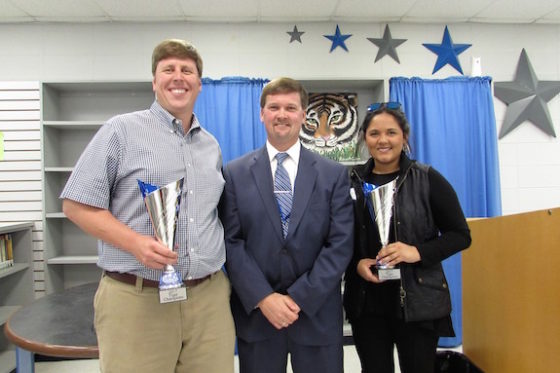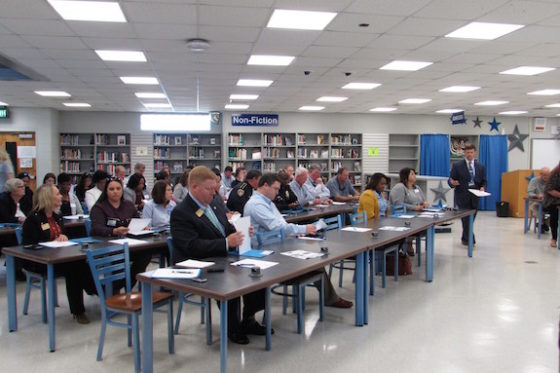DCS holds stakeholder luncheon
 Demopolis City Schools honored its supporters Thursday at the second annual Stakeholder Luncheon held in the Demopolis High School library.
Demopolis City Schools honored its supporters Thursday at the second annual Stakeholder Luncheon held in the Demopolis High School library.
The event, explained Supt. Kyle Kallhoff, is a way of thanking all the people who support the school system and bring them up to date on its progress.
Each of the four Demopolis principals gave a brief overview of one thing the school was focusing on this year. Kallhoff stressed the upcoming 3-mil renewal vote on the Dec. 12 ballot in Demopolis and reported on enrollment and budget trends and the capital plan.
 At the conclusion of the presentation, Kallhoff recognized two people who have worked tirelessly on behalf of the school system. Named 2017 Tiger Champions were J.R. Rivas and Jason Windham.
At the conclusion of the presentation, Kallhoff recognized two people who have worked tirelessly on behalf of the school system. Named 2017 Tiger Champions were J.R. Rivas and Jason Windham.
Kallhoff said the renewal of the 3-mil property tax is held every 10 years. It is limited to voters in District 2, who, 10 years ago, approved the renewal by 87 percent. The tax brings in up to $250,000 annually.
The financial support of the school system by local residents “is one of the things that separates us from the rest of the Black Belt,” said Kallhoff.
Enrollment in Demopolis schools is 2,331, the first time in five years it has gone over 2,300, he continued. The figures show a growth of 127 students since the 2013-2014 year, and this year’s totals do not include the pre-K enrollment of 51.
The school system must consider adding on to its campuses since they are reaching their capacity. “We need to accept growth or stop growth,” said Kallhoff.
One of the considerations is whether to accept students from outside the city limits. Demopolis has an open enrollment system, which means it welcomes students from Marengo and other counties and doesn’t charge tuition. Almost half the current enrollment – 1,067 – are from out of city.
Accepting those students greatly helps with state funding, said the superintendent, but local funding is not greatly impacted with higher out-of-system numbers.
Demopolis schools get 11 percent of its money from federal sources, 64 percent from the state and 22 percent from local funding. Another 3 percent come from school-based fees.
The local financial support is above average for the state, Kallhoff said. He also praised the Demopolis City Schools Foundation for, among other things, making it possible to purchase robots for coding and programming classes and for the broadcasting programs on the campuses.
He reviewed the nine Career Tech programs now offered at DHS, including the newest HVAC dual-enrollment curriculum with Shelton State. He said 68 percent of DHS students are involved in some career-based program.
Not included in the career tech curriculum is the broadcasting cluster. It is separate so that it can be more flexible and creative than what a state-sponsored curriculum would allow.
Kallhoff went over the Capital Plan Five-Year Plan submitted to the state every year. Of the eight priorities on the list, only the first two are being addressed with the funding available. They are adapting Demopolis Middle School to meet ADA requirements and remodeling all student restrooms in the schools.
Westside Elementary School principal Roshanda Jackson chose the Leader in Me process as her one area of focus to discuss. It is a whole school transformation that helps develop children to be competent individuals.
Both Leon Clark at USJ and Brandon Kiser at DMS spoke on the coding, programming and robotics courses at their schools. “We’re preparing our students for jobs that don’t exist yet,” said Kiser.
DHS principal Blaine Hathcock said he was disappointed that his school was not listed in among the top 50 in the state by ACT scores. “That’s not acceptable.”
DHS has instituted a school-wide effort focusing on ACT skills. While all the scores aren’t in yet, he said there has been remarkable progress among those that have been returned. Higher ACT scores can equate to thousands of dollars in scholarships for students.
“The bar is going to move,” he said. “We’re going to be in the top 50 or die trying.”

